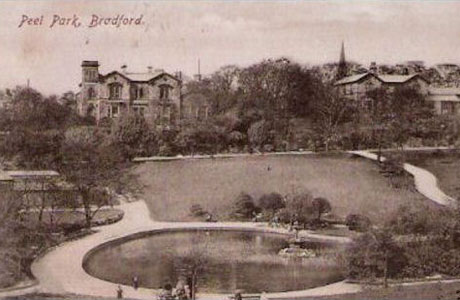
Peel Park: Circa 1900
If you think we have come a long way in the brass band contesting world, then here’s a look at how volatile Victorian banding was in Bradford in 1858.
All this ahead of the Area battles at the town’s St George’s Hall next March too.
Age old problems
It’s also interesting to note that the age old problems of ‘bona fide’ players, partisan audiences, bespoke test pieces, twin discipline contests and conductors making an arse of themselves on stage isn’t new either....
This wonderfully descriptive report comes from 'The Bradford Observer', dated, September 2nd 1858, on the first ever brass band contest which was held in the town’s Peel Park on Saturday 28th August 1858.
The regulations of the contest came under the auspices of Mr Jackson, music seller of Kirkgate in Bradford.
It was some event.
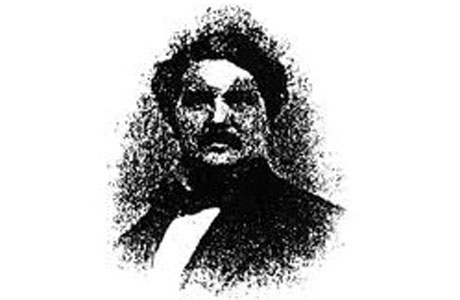
A rare image of the impresario Enderby Jackson
Entrants
Initially it was reported that the following bands would take part under their conductors for forty pounds of prize money:
Saltaire (20 performers) – led by Mr Jos Rhodes
Baildon (17 performers) – led by Mr Bentley
Morley (18 performers) – led by John Peel
Cleckheaton Victoria (18 performers) – led by B. Robinson
Bramley (18 performers) – led by Jos. Jackson
Slaithwaite Union (16 performers) led by E.T. Bardsley
Bradford Railway Foundry (15 performers) – led by E. Wooller
Black Dike Mills (16 performers) – led by F. Galloway
Ossett Victoria (16 performers) – led by W. Lofthouse
Dewsbury (18 performers) – led by W. Blackburn
Heaton (18 performers) – led by B. Bennett
Almondbury (12 performers) – led by J. Vickerman
Leeds Milburn’s (18 performers) – led by H. Milburn
This is what transpired...
The news report September 2nd, 1858:
"Our fickle climate turned up a bright fine day on Saturday, and, as a natural result, our citizens of all grades, augmented by arrivals from distant place, as well as thousands from the immediate district, thronged the slopes of Peel Park intent on hearing the various bands compete for the prizes of the day.
In the earlier part of the afternoon the muster of people was only scanty, but as the day wore on they streamed in by hundreds and we believe that the assemblage during the afternoon was one of the largest ever seen in the Park.
This fact is more astonishing when it is recollected that the week was rife with other amusements – the Cricket Match, the Flower Show, the Rev W. Punshon’s interesting lecture, and railway trips to various places.
Culminating success
Despite all these counter attractions, the gala in the Park was the culminating success of the week, attended as it was, by close on 13,000 people.
The behaviour of this immense number of visitors was excellent, and their orderly conduct presented a marked contrast to the turbulent spirit evinced by the bandsmen.
The various pieces were listened to with the greatest of attention and patience; although towards the close of the protracted contest a cool chilly wind blew.
The applause, on the whole, was discriminative, for we count nothing of the partisan applause got up by friends of the bands, which was occasionally rather out of place, to say the least of it.
Twelve bands, comprising some of the first “brass” talent of the West Riding, had entered the contest, but only eight of them put in an appearance.
These were – Milburn’s (Leeds); Cleckheaton (Victoria); Bramley; Black Dyke Mills; Saltaire; Slaithwaite Union; Baildon; and Bradford Railway Foundry.
We have placed them in order as they were balloted to play.
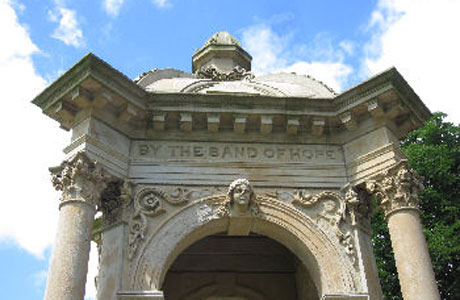
Bands of Hope: The Peel Park Band of Hope monument
Judges and music
The Judges – Mr Tuckwell, bandmaster of the 5th Dragoon Guards, and Mr G.W. Phillips, an eminent musician, of Liverpool: together with Mr W. Jackson, as referee, took their seats in a tent, pitched a short distance in front of the orchestra, to note the performances of each band.
As we mentioned last week, each band had to play a piece of music, composed expressly for the occasion by Mr Jackson, to test their reading ability, and then to play a second time whatever composition they each chose.
To each of these competitions a scale of four prizes was awarded, the first receiving £10; 2nd, £5; 3rd, £3; 4th, £2. Thus £40 in all was given away.
Tasteful
We may premise that Mr Jackson’s piece was in two movements - an andante and allegro - and that it was a rather tasteful and pleasing composition, indeed so agreeable to listen to that it eighth repetition did not pall upon the ear.
This feature may partly be accounted for by the composition of the bands, the instrumentalists in each varying both in number and strength, and hence there was an apparent difference even in the performance of the same tune.
The piece had been forwarded to the leaders of the bands some time previously for study and practice, but none of the bands interpreted the first movement to the satisfaction of the composer, whose idea was that it should have been played in a more lively style, and not given so solemnly.
Noise and tumult
Milburn’s band entered the orchestra first, about half-past three, amid considerable noise and tumult, which subsided, however, when one of the bandsmen was ejected.
Cleckheaton came next, and an objection was taken to one of their men, but the malcontents were silenced by the leader vouching that his performers were all bona fide members of the band.
Similar interruption ensued when Bramley came on to play, and the dispute was not compromised until arguments, both loud and strong were used.
The Black Dyke men were not disturbed, and they played their part in peace, conducted by Mr S. Longbottom.
Disturbing elements
The appearance of the Saltaire band again raised the disturbing elements. They were assailed by outcries, shouts of “turn him out”, and counter demonstrations from their friends, producing a disgraceful scene that utterly defies description.
A brief subsidence of the noise, and the leader essayed to begin, his men blew their loudest and strongest, but louder above all arose the yells of a mob of instrumentalists, congregated at the end of the orchestra, and the “brazen brass” rung out the wildest notes, now shrieking from a trumpet or cornet, and anon rising in the deep guttural tones of the ophicleides and trombones.
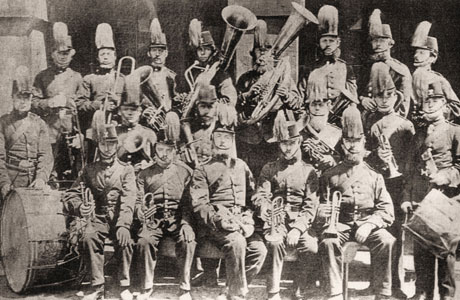
Black Dyke circa 1865
Vexatious
The confusion was really “most confounded” and very vexatious.
This scene and others lasted perhaps half an hour, the leader of the Saltaire band “making faces” at his opponents, and trying to appear cool, “sitting down to wait it out”, and acting certainly in a most foolish and reckless manner.
Judge out of tent
At length he made a desperate start, but his opponents started also, and there was another outrageous scene of tumult and noise, in the midst of which, Mr Jackson made his appearance from the tent, and at once went to Mr Smith, leader of the Saltaire band, and ordered the removal of the individual objected to, a trombone player, who, it appears, was a professional man, and not entitled to play at all in the contest.
Mr Smith bowed to the Referee’s calm and dispassionate decision, and the band was then allowed to play the tune in quietness.
Slaithwaite, Baildon and the Railway Foundry bands followed, finishing up the first part of the programme.
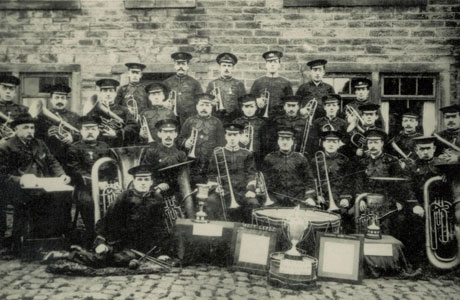
The Bramley Band around 1910
Interval
After a brief interval, the second part was led off by Bramley, followed by the Railway Foundry, Milburn’s, Black Dyke, and Saltaire. It was now dusk.
Candles, boys, and naptha lights were procured, the boys holding the illuminators, and thus Slaithwaite, Baildon and Cleckheaton had to finish at a great disadvantage.
Decision
Shortly afterwards the Judges announced their decision to be. For Mr Jackson’s piece:- Bramley 1st; Baildon, 2nd; Black Dyke, 3rd; and Cleckheaton, 4th. For their own music:- Black Dyke, 1st; Baildon, 2nd; Saltaire, 3rd; and Cleckheaton, 4th.
The announcement was received with loud applause. Several of the bands afterwards occupied the orchestra, and the National Anthem was pealed forth in capital style.
Thus ended the first brass band contest in Peel Park.
May it be the last at which we shall have to witness such noisy quarrelsome scenes.
Impair ability
There is no doubt that the uproar would agitate the performers to such a degree as to impair their ability to play well and steadily; and thus, while the audience were insulted by unseemly brawling, the bandsmen were not benefitted in the least, but rather injured, as the time wasted in disruption frittered the daylight away, and the band which came last laboured under the discouraging difficulty of not able readily to decipher their notes.
However, not withstanding their agitated state, we must do the bands justice, and say that, with two exceptions, they all played well, some better than others, as the Judges no doubt wisely thought, but all far above mediocrity.
While admiring the judgment and precision of style which characterised the playing of the Bramley, Baildon, Black Dyke and Saltaire bands, we cannot ignore the sweetness and beautiful tone of the Cleckheaton band; they sustained and able part in the contest, and their efforts were favourably and freely commented on by the audience.
Milburn’s band has played better, and there is room for improvement in the Railway Foundry band and in the Slaithwaite men."
Postscript:
It seems this could well be a report on a brass band contest of the 21st century, let alone the 19th.
The proceedings were wound up by a fireworks display, the financial settlement was deemed ‘satisfactory’ and it was noted that of the 18,000 who attended, 476 came as ‘ladies and gentlemen’, whilst bandsmen were entitled to a free pass.
The report ended by saying: “Just as the fireworks concluded, the moon rose brightly over the crest of the hill, shedding her delicious beams on the happy scene, and serving to light the pleasure seekers on their way home.”
Mr Jackson went on to promote numerous brass band copntests in the years to come - both at Bradford and of course at Crystal Palace, whilst some of the competing bands went on to greater success too - including Black Dyke.
As for test pieces, split draws, player registration, partisan support and conductors making a fool of themselves on stage, etc?
Thankfully, they are all a thing of the past?
Iwan Fox













